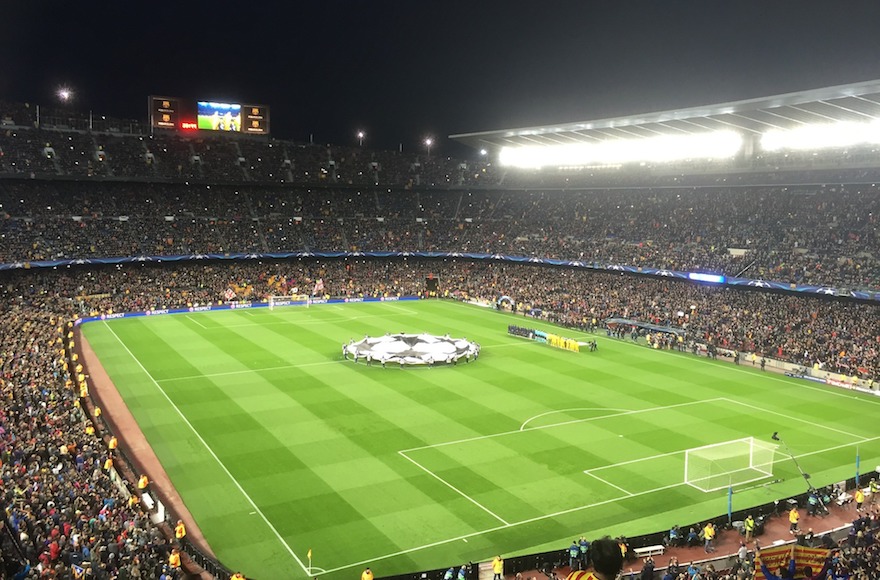MADRID, June 18 (JTA) — A Spanish advertising executive has lost his campaign to become president of one of Europe´s legendary soccer teams after a rival accused him of covering up his Jewish identity. But Lluis Bassat´s Jewishness may have been less important in his failed bid to take over FC Barcelona than the prospect — mistaken in the end — that his rival for the club´s ownership might snag one of the world´s top soccer figures, England´s David Beckham. In the end, Beckham was sold this week to Barcelona´s archenemy, Real Madrid, for $41 million. But the reference to Bassat´s Jewishness triggered a debate — in newspapers´ sports and Op-Ed pages, on talk shows and on the streets of this soccer-crazed nation — about whether a Jew could be head of a soccer club. Bassat, who is president of the advertising firm Bassat Ogilvy & Mather Europe, got 32 percent of the 50,000 votes cast for president last weekend by the members of the soccer team, affectionately known as “Barca.” Barcelona lawyer Joan Laporta won the election with 52 percent of the vote. During the campaign, another of the six candidates, Jaume Llaurado Gracia, asked Bassat why he only goes by one last name, when most Spaniards use two surnames — that of their father and mother — on official documents. “We all have a father and a mother, but Bassat never utters his second surname, which is Coen. We´d like him to explain why,” Llaurado said during a live televised debate, prompting Bassat to walk off the set. Coen is the Spanish version of Cohen, one local paper explained, and “immediately identifies one as belonging to the international Jewish community.” Bassat is the descendant of Sephardi Jews from Salonika, Greece, who immigrated to Barcelona in the early 20th century. At the time, the Spanish government was reaching out to descendants of Jews who had been expelled from Spain in the Middle Ages and offering them citizenship. Many of them still spoke Spanish and were useful commercial contacts in their native countries. While Bassat rarely mentions his Jewish heritage in public, he is the founder and a leading benefactor of Barcelona´s Reform congregation, Atid. During the campaign, many political and sports commentators defended his right to keep his religious affiliation out of the race. A columnist in the La Razon newspaper, Tomas Cuesta, accused Llaurado of behaving like a medieval “inquisitor” and of “igniting the smokestacks of Auschwitz.” “I don´t use my second surname,” said Baltasar Porcel who writes in Barcelona´s La Vanguardia newspaper. “Does that make me suspicious?” But others saw Bassat´s Jewishness as a legitimate topic for debate. On one radio talk show, debaters questioned whether Bassat would be able to participate in all of the club´s traditions. For Barcelona and many other soccer teams in this secular country still steeped in Roman Catholic ritual, the players´ first stop after winning a tournament trophy is the local church to offer the prize to the Virgin Mary. A leader of Barcelona´s Palestinian community urged voters not to elect Bassat, warning that he would put the club in the hands of “Jewish American interests.” A source close to Bassat´s campaign team said Llaurado´s comment had a clear effect on the outcome of the election. Before the televised debate, the source noted, Bassat held a comfortable 30 percent margin over other contenders in the opinion polls. “Everybody thought Bassat would win,” the source said. “I don´t know how else to explain such a drastic turnaround.” But Isaac Levy, a spokesman for the Barcelona Jewish community, said the comment only cost Bassat “possibly 500 or 1,000 votes.” Levy, who is also a club member, said he voted for Bassat. He thinks Bassat lost because he represented the recent past on a team that has had several horrendous seasons, Levy said. FC Barcelona was once a soccer powerhouse under Dutch coach Johan Cruyff, but lately it has run up huge debts and embarrassing losses to some of the weakest teams in the Spanish league. Bassat proposed creating a foundation to safeguard the team´s stadium and other assets, but “the young people wanted change, and Bassat´s misjudgment is that he didn´t represent change,” Levy said. Election winner Laporta, on the other hand, surged in popularity after getting Britain´s Manchester United club to accept an offer for the transfer of Beckham, who also is known for his marriage to Victoria, formerly Posh Spice of the British pop group the Spice Girls. However, this week Real Madrid won the tug of war when Beckham chose to be transferred to the Madrid team, joining its stable of international superstars. As for Llaurado, his gambit about Bassat´s Jewishness didn´t help him much: He finished last in the election, with less than 2 percent of the vote.
JTA has documented Jewish history in real-time for over a century. Keep our journalism strong by joining us in supporting independent, award-winning reporting.






